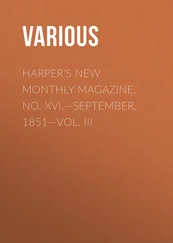Various - Harper's New Monthly Magazine, No. XXIV, May 1852, Vol. IV
Здесь есть возможность читать онлайн «Various - Harper's New Monthly Magazine, No. XXIV, May 1852, Vol. IV» — ознакомительный отрывок электронной книги совершенно бесплатно, а после прочтения отрывка купить полную версию. В некоторых случаях можно слушать аудио, скачать через торрент в формате fb2 и присутствует краткое содержание. Издательство: Иностранный паблик, Жанр: periodic, foreign_edu, на английском языке. Описание произведения, (предисловие) а так же отзывы посетителей доступны на портале библиотеки ЛибКат.
- Название:Harper's New Monthly Magazine, No. XXIV, May 1852, Vol. IV
- Автор:
- Издательство:Иностранный паблик
- Жанр:
- Год:неизвестен
- ISBN:нет данных
- Рейтинг книги:4 / 5. Голосов: 1
-
Избранное:Добавить в избранное
- Отзывы:
-
Ваша оценка:
- 80
- 1
- 2
- 3
- 4
- 5
Harper's New Monthly Magazine, No. XXIV, May 1852, Vol. IV: краткое содержание, описание и аннотация
Предлагаем к чтению аннотацию, описание, краткое содержание или предисловие (зависит от того, что написал сам автор книги «Harper's New Monthly Magazine, No. XXIV, May 1852, Vol. IV»). Если вы не нашли необходимую информацию о книге — напишите в комментариях, мы постараемся отыскать её.
Harper's New Monthly Magazine, No. XXIV, May 1852, Vol. IV — читать онлайн ознакомительный отрывок
Ниже представлен текст книги, разбитый по страницам. Система сохранения места последней прочитанной страницы, позволяет с удобством читать онлайн бесплатно книгу «Harper's New Monthly Magazine, No. XXIV, May 1852, Vol. IV», без необходимости каждый раз заново искать на чём Вы остановились. Поставьте закладку, и сможете в любой момент перейти на страницу, на которой закончили чтение.
Интервал:
Закладка:
There was no possibility of parrying these home thrusts. Lord Grenville consequently entirely lost his temper. Replying in a note even more angry and bitter than the first, he declared that England was fighting for the security of all governments against French Jacobinism, and that hostilities would be immediately urged on anew without any relaxation. Napoleon was not at all disappointed or disheartened at the result of this correspondence. He earnestly desired peace. But he was not afraid of war. Conscious of the principle, "thrice is he armed who hath his quarrel just," he was happy in the conviction that the sympathies of impartial men in all nations would be with him. He knew that the arrogant tone assumed by England, would unite France as one man, in determined and undying resistance. "The answer," said he, "filled me with satisfaction. It could not have been more favorable. England wants war. She shall have it. Yes! yes! war to the death."
The throne of the King of England, the opulence of her bishops, and the enormous estates of her nobles were perhaps dependent upon the issue of this conflict. The demolition of all exclusive privileges, and the establishment of perfect equality of rights among all classes of men in France, must have shaken the throne, the aristocracy, and the hierarchy of England, with earthquake power. The government of England was mainly in the hands of the king, the bishops, and the lords. Their all was at stake. In a temptation so sore, frail human nature must not be too severely censured. For nearly ten years, the princes of France had been wandering houseless fugitives over Europe. The nobles of France, ejected from their castles, with their estates confiscated, were beggars in all lands. Bishops who had been wrapped in ermine, and who had rolled in chariots of splendor, were glad to warm their shivering limbs by the fire of the peasant, and to satiate their hunger with his black bread. To king, and bishop, and noble, in England, this was a fearful warning. It seemed to be necessary for their salvation to prevent all friendly intercourse between England and France, to hold up the principles of the French Revolution to execration, and above all, to excite, if possible, the detestation of the people of England, against Napoleon, the child and the champion of popular rights. Napoleon was the great foe to be feared, for with his resplendent genius he was enthroning himself in the hearts of the people of all lands.
But no impartial man, in either hemisphere, can question that the right was with Napoleon. It was not the duty of the thirty millions of France to ask permission of the fifteen millions of England to modify their government. The kings of Europe, led by England, had combined to force with the bayonet, upon France, a rejected and an execrated dynasty. The inexperienced Republic, distracted and impoverished by these terrific blows, was fast falling to ruin. The people invested Napoleon with almost dictatorial powers for their rescue. It was their only hope. Napoleon, though conscious of strength, in the name of bleeding humanity, pleaded for peace. His advances were met with contumely and scorn, and the trumpet notes of defiant hosts rang from the Thames to the Danube. The ports of France were blockaded by England's invincible fleet, demolishing the feeble navy of the Republic, and bombarding her cities. An army of three hundred thousand men pressed upon the frontiers of France, threatening a triumphant march to her capital, there to compel, by bayonet and bomb-shell, the French people to receive a Bourbon for their king. There was no alternative left to Napoleon but to defend his country. Most nobly he did it.
The correspondence with the British government, which redounds so much to the honor of Napoleon, vastly multiplied his friends among the masses of the people in England, and roused in parliament, a very formidable opposition to the measures of government. This opposition was headed by Fox, Sheridan, Lord Erskine, the Duke of Bedford, and Lord Holland. They did not adopt the atrocious maxim, "Our country – right or wrong," but rather the ennobling principle "Our country – when in the wrong, we will try to put her right." Never, in the history of the world, has there been a more spirited or a more eloquent opposition than this question elicited. Fox, the rival of Pitt, and the profound admirer of Napoleon, was the most prominent leader of this opposition. Napoleon, with his laconic and graphic eloquence, thus describes the antagonistic English statesmen. "In Fox, the heart warmed the genius. In Pitt the genius withered the heart."
"You ask," the opposition exclaimed, "who was the aggressor? What matters that? You say it was France. France says it was England. The party you accuse of being the aggressor is the first to offer to lay down arms. Shall interminable war continue merely to settle a question of history? You say it is useless to treat with France. Yet you treated with the Directory. Prussia and Spain have treated with the Republic, and have found no cause for complaint. You speak of the crimes of France. And yet your ally, Naples, commits crimes more atrocious, without the excuse of popular excitement. You speak of ambition. But Russia, Prussia, and Austria, have divided Poland. Austria grasps the provinces of Italy. You yourself take possession of India, of part of the Spanish, and of all the Dutch colonies. Who shall say that one is more guilty than another in this strife of avarice. If you ever intend to treat with the French Republic, there can be no more favorable moment than the present."
By way of commentary upon the suggestion that France must re-enthrone the Bourbons, a letter was published, either real or pretended, from the heir of the exiled house of Stuart, demanding from George the Third, the throne of his ancestors. There was no possible way of parrying this home thrust. George the Third, by his own admission, was an usurper, seated upon the throne of the exiled Stuarts. The opposition enjoyed exceedingly the confusion produced, in the enemies' ranks, by this well-directed shot.
The government replied, "Peace with Republican France endangers all the monarchies of Europe. The First Consul is but carrying out, with tremendous energy, the principles of the revolution – the supremacy of the people. Peace with France is but a cessation of resistance to wrong. France still retains the sentiments which characterized the dawn of her revolution. She was democratic. She is democratic. She declares war against kings. She continues to seek their destruction."
There was much force in these declarations. It is true that Napoleon was not, in the strict sense of the word, a democrat. He was not in favor of placing the government in the hands of the great mass of the people. He made no disguise of his conviction that in France the people had neither the intelligence nor the virtue essential to the support of a wise and stable republic. Distinctly he avowed that in his judgment the experiment of a republic had utterly failed, that France must return to monarchy. The great mass of the people were also satisfied of this necessity. "The French generally," said Napoleon, "do not ask for liberty . They only seek equality ."
But France no longer wished for an aristocratic king, who would confer wealth, splendor, and power exclusively upon his nobles. The old feudal throne was still hated with implacable hatred. France demanded a popular throne; a king for the people, one who would consult the interests of the masses, who would throw open to all alike the avenues of influence and honor and opulence. Such a monarch was Napoleon. The people adored him. He is our emperor, they shouted with enthusiasm. We will make him greater than all the kings of all the nobles. His palaces shall be more sumptuous, his retinue more magnificent, his glory more dazzling; for our daughters may enter his court as maids of honor, and our sons may go in and out at the Tuileries, Versailles, and St. Cloud, the marshals of France. Lord Grenville was right in saying that Napoleon was but carrying out the principles of the revolution – equality of privileges – the supremacy of popular rights. But the despots of Europe were as hostile to such a king as to a republic.
Читать дальшеИнтервал:
Закладка:
Похожие книги на «Harper's New Monthly Magazine, No. XXIV, May 1852, Vol. IV»
Представляем Вашему вниманию похожие книги на «Harper's New Monthly Magazine, No. XXIV, May 1852, Vol. IV» списком для выбора. Мы отобрали схожую по названию и смыслу литературу в надежде предоставить читателям больше вариантов отыскать новые, интересные, ещё непрочитанные произведения.
Обсуждение, отзывы о книге «Harper's New Monthly Magazine, No. XXIV, May 1852, Vol. IV» и просто собственные мнения читателей. Оставьте ваши комментарии, напишите, что Вы думаете о произведении, его смысле или главных героях. Укажите что конкретно понравилось, а что нет, и почему Вы так считаете.












